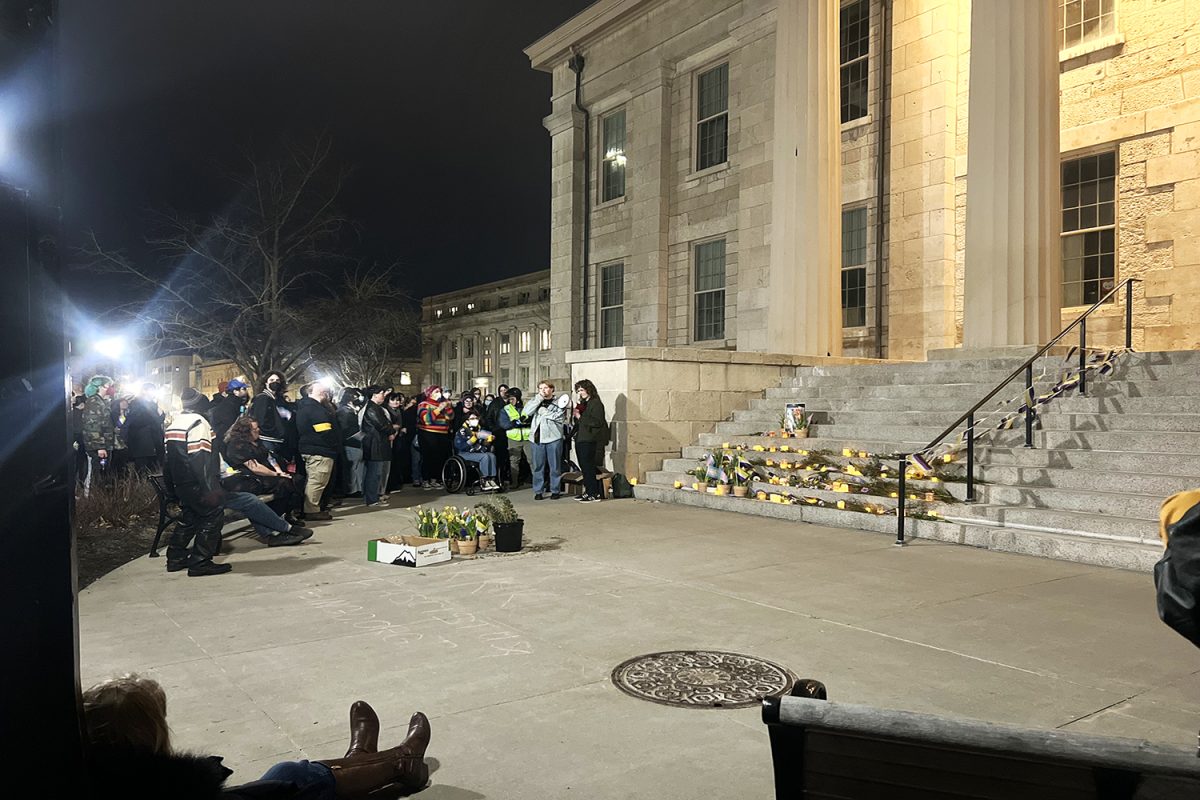More than 100 Iowa City residents placed nonbinary flags, flowers, and lanterns on the steps of the Old Capitol at a Friday night vigil in remembrance of Nex Benedict, a 16-year-old nonbinary teenager who died just a day after a physical altercation in the bathroom of their Oklahoma high school.
Benedict, a 10th grader at Owasso High School, collapsed the day after a fight in a bathroom at their public school on Feb. 7. The 10th grader was reportedly bullied for identifying as nonbinary.
Learn more:
After the fight, Benedict’s family took them to the hospital, and they were sent home later that night. The next day, paramedics were dispatched to Benedict’s home after the teen collapsed and they were transported to the hospital, where Benedict later died.
Police in the suburban Oklahoma community said in a statement the preliminary autopsy results indicate the teen did not die as a result of injuries sustained in the fight, however, the cause of death has not yet been determined.
Taylor Miller, 28, of Iowa City, described the gathering as a funeral for Benedict.
“It’s heartbreaking,” they said. “It’s so clearly connected and deeply correlated with the absolute torrential state of anti-trans laws. The anti-trans agenda that is being pushed by hateful, hateful adults — fully grown adults — has led to the tragic death of a 16-year-old.”
Camille Leonard, 21, of Iowa City, said Benedict’s death brought back a lot of memories from when they were Benedict’s age. Leonard said they were at the vigil because Benedict should not have died.
“It’s a disgusting feeling,” Leonard said. “It feels disgusting knowing what happened to that poor kid.”
Benedict, while not a citizen of the Choctaw Nation in Oklahoma, has ties to the community. The Oklahoman reported that Gary Batton, chief of the Choctaw Nation in southeast Oklahoma, said their death “weighs heavily on the community.”
Sikowis Nobiss, a member of Plains Cree/Saulteaux of the George Gordon First Nation and founder and executive director of the Great Plains Action Society, said in an interview with The Daily Iowan, that harm against two-spirit and LGBTQ+ Indigenous people is not something new. Still, Nobiss said this incident is particularly hitting because schools are supposed to be safe spaces.
“We’re here to stand in power, we’re here to stand for Nex and for all the children that are in harm’s way right now,” Nobiss said to the crowd. “Iowa is on its way to doing so much harm — they are doing harm.”
The American Civil Liberties Union, the ACLU of Oklahoma, and Lambda Legal issued a joint statement on Feb. 20.
“The assault on Nex is an inevitable result of the hateful rhetoric and discriminatory legislation targeting Oklahoma trans youth,” the group message states. “Policies that put transgender students in danger make schools less safe places for all students.”
Oklahoma holds similar “bathroom laws” as Iowa. Two years ago, Oklahoma lawmakers passed a law requiring all public and public charter schools in the state that serve pre-K through 12th-grade students to designate bathrooms for the “exclusive use of either the male or the female sex, as designated on individuals’ original birth certificates.”
In spring 2023, Iowa Gov. Kim Reynolds signed a law preventing transgender students from entering school bathrooms that correspond with their gender identities. Senate File 538, enacted the same day, prevents doctors from administering gender-affirming care to those under 18 years old.
Republicans say these laws protect children’s safety while using school restrooms, but activists argue that violence, such as what happened to Nex, will occur if transgender students are unable to use a bathroom that aligns with their identity.
Leonard said the legislation on bathrooms was “abhorrent and disgusting.”
“Stop policing children on their genitalia,” they said. “It doesn’t matter what you think is right. Kids are dying by their own hand and of course by the hands of others”
Iowa lawmakers introduced over 40 bills, according to One Iowa Action an LGBTQ+ advocacy group, that would affect LGBTQ+ rights this session, including measures to legally define “man” and “woman” in Iowa law, requiring new birth certificates for transgender Iowans that identify their gender assigned at birth and their current identity, and prohibiting educators from being disciplined for not using a student’s preferred name or pronouns.
Since the first legislative deadline passed last week, seven of the bills remain viable. According to the American Civil Liberties Union, there were 400 proposals filed to restrict the rights of LGBTQ+ individuals nationwide, especially transgender people, in 2023.



